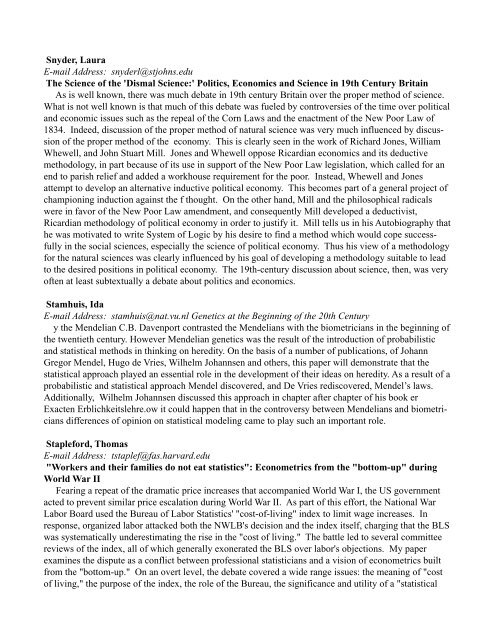Listing of Sessions and Abstracts of Papers - History of Science ...
Listing of Sessions and Abstracts of Papers - History of Science ...
Listing of Sessions and Abstracts of Papers - History of Science ...
Create successful ePaper yourself
Turn your PDF publications into a flip-book with our unique Google optimized e-Paper software.
Snyder, Laura<br />
E-mail Address: snyderl@stjohns.edu<br />
The <strong>Science</strong> <strong>of</strong> the 'Dismal <strong>Science</strong>:' Politics, Economics <strong>and</strong> <strong>Science</strong> in 19th Century Britain<br />
As is well known, there was much debate in 19th century Britain over the proper method <strong>of</strong> science.<br />
What is not well known is that much <strong>of</strong> this debate was fueled by controversies <strong>of</strong> the time over political<br />
<strong>and</strong> economic issues such as the repeal <strong>of</strong> the Corn Laws <strong>and</strong> the enactment <strong>of</strong> the New Poor Law <strong>of</strong><br />
1834. Indeed, discussion <strong>of</strong> the proper method <strong>of</strong> natural science was very much influenced by discussion<br />
<strong>of</strong> the proper method <strong>of</strong> the economy. This is clearly seen in the work <strong>of</strong> Richard Jones, William<br />
Whewell, <strong>and</strong> John Stuart Mill. Jones <strong>and</strong> Whewell oppose Ricardian economics <strong>and</strong> its deductive<br />
methodology, in part because <strong>of</strong> its use in support <strong>of</strong> the New Poor Law legislation, which called for an<br />
end to parish relief <strong>and</strong> added a workhouse requirement for the poor. Instead, Whewell <strong>and</strong> Jones<br />
attempt to develop an alternative inductive political economy. This becomes part <strong>of</strong> a general project <strong>of</strong><br />
championing induction against the f thought. On the other h<strong>and</strong>, Mill <strong>and</strong> the philosophical radicals<br />
were in favor <strong>of</strong> the New Poor Law amendment, <strong>and</strong> consequently Mill developed a deductivist,<br />
Ricardian methodology <strong>of</strong> political economy in order to justify it. Mill tells us in his Autobiography that<br />
he was motivated to write System <strong>of</strong> Logic by his desire to find a method which would cope successfully<br />
in the social sciences, especially the science <strong>of</strong> political economy. Thus his view <strong>of</strong> a methodology<br />
for the natural sciences was clearly influenced by his goal <strong>of</strong> developing a methodology suitable to lead<br />
to the desired positions in political economy. The 19th-century discussion about science, then, was very<br />
<strong>of</strong>ten at least subtextually a debate about politics <strong>and</strong> economics.<br />
Stamhuis, Ida<br />
E-mail Address: stamhuis@nat.vu.nl Genetics at the Beginning <strong>of</strong> the 20th Century<br />
y the Mendelian C.B. Davenport contrasted the Mendelians with the biometricians in the beginning <strong>of</strong><br />
the twentieth century. However Mendelian genetics was the result <strong>of</strong> the introduction <strong>of</strong> probabilistic<br />
<strong>and</strong> statistical methods in thinking on heredity. On the basis <strong>of</strong> a number <strong>of</strong> publications, <strong>of</strong> Johann<br />
Gregor Mendel, Hugo de Vries, Wilhelm Johannsen <strong>and</strong> others, this paper will demonstrate that the<br />
statistical approach played an essential role in the development <strong>of</strong> their ideas on heredity. As a result <strong>of</strong> a<br />
probabilistic <strong>and</strong> statistical approach Mendel discovered, <strong>and</strong> De Vries rediscovered, Mendel’s laws.<br />
Additionally, Wilhelm Johannsen discussed this approach in chapter after chapter <strong>of</strong> his book er<br />
Exacten Erblichkeitslehre.ow it could happen that in the controversy between Mendelians <strong>and</strong> biometricians<br />
differences <strong>of</strong> opinion on statistical modeling came to play such an important role.<br />
Stapleford, Thomas<br />
E-mail Address: tstaplef@fas.harvard.edu<br />
"Workers <strong>and</strong> their families do not eat statistics": Econometrics from the "bottom-up" during<br />
World War II<br />
Fearing a repeat <strong>of</strong> the dramatic price increases that accompanied World War I, the US government<br />
acted to prevent similar price escalation during World War II. As part <strong>of</strong> this effort, the National War<br />
Labor Board used the Bureau <strong>of</strong> Labor Statistics' "cost-<strong>of</strong>-living" index to limit wage increases. In<br />
response, organized labor attacked both the NWLB's decision <strong>and</strong> the index itself, charging that the BLS<br />
was systematically underestimating the rise in the "cost <strong>of</strong> living." The battle led to several committee<br />
reviews <strong>of</strong> the index, all <strong>of</strong> which generally exonerated the BLS over labor's objections. My paper<br />
examines the dispute as a conflict between pr<strong>of</strong>essional statisticians <strong>and</strong> a vision <strong>of</strong> econometrics built<br />
from the "bottom-up." On an overt level, the debate covered a wide range issues: the meaning <strong>of</strong> "cost<br />
<strong>of</strong> living," the purpose <strong>of</strong> the index, the role <strong>of</strong> the Bureau, the significance <strong>and</strong> utility <strong>of</strong> a "statistical
















